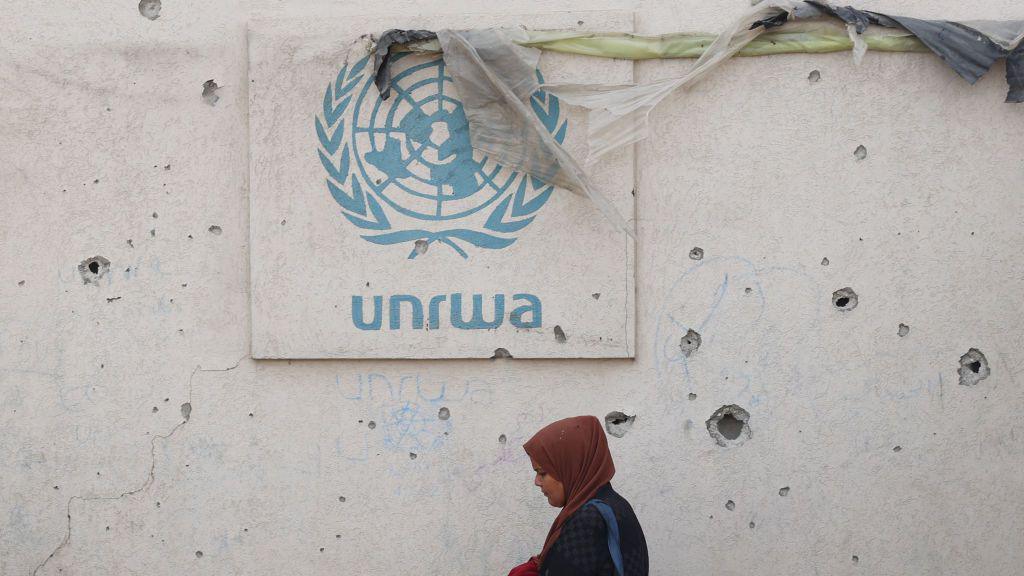Gaza aid fears as Israel bans UN Palestinian refugee agency

- Published
Israel's parliament has voted to pass legislation banning the UN's Palestinian refugee agency (Unrwa) from operating within Israel and occupied East Jerusalem, accusing the organisation of colluding with Hamas in Gaza.
Contact between Unrwa employees and Israeli officials will be banned within three months, severely limiting the agency's ability to operate in Gaza and the Israeli-occupied West Bank.
Co-operation with the Israeli military - which controls all crossings into Gaza - is essential for Unrwa to transfer aid into the territory. It is the main UN organisation working on the ground there.
Several countries, including the US and the UK, have expressed serious concern about the move.
Israel still preventing humanitarian missions to north Gaza, Unrwa says
- Published21 October 2024
US State Department spokesman, Matthew Miller, urged Israel to reconsider the ban, saying Unrwa is “irreplaceable” right now in delivering humanitarian aid in Gaza.
UK Prime Minister Sir Keir Starmer said the laws risk making Unrwa's "essential work for Palestinians impossible, jeopardising the entire international humanitarian response in Gaza".
UN chief Antonio Guterres said the move would have "devastating consequences for Palestine refugees".
Almost all of the enclave's population of more than two million people are dependent on aid and services from the agency.
Unrwa director says Gaza aid supply chain will 'fall apart'
But Israel has objected to Unrwa for decades, with its opposition intensifying in recent years.
Israel says Unrwa staff have colluded with Hamas in Gaza, and claimed 19 Unrwa workers took part in the Hamas attacks of 7 October 2023.
The UN investigated Israel’s claim and fired nine of those accused, but it said Israel had not provided evidence for broader allegations. Unrwa insists that dealings with Hamas are purely to enable the agency to do its job.
The accusations against Unrwa prompted many Western countries including the US and UK to withdraw their funding earlier this year, but most have since reinstated their support.
Israel's parliament, the Knesset, approved the two bills by an overwhelming majority on Monday evening.
The new laws will also see Unrwa staff lose their legal immunity within Israel, and the agency's headquarters in East Jerusalem will be closed.
Prime Minister Benjamin Netanyahu said that "Unrwa workers involved in terrorist activities against Israel must be held accountable", but added that "sustained humanitarian aid must remain available in Gaza".
"We stand ready to work with our international partners to ensure Israel continues to facilitate humanitarian aid to civilians in Gaza in a way that does not threaten Israel's security," he said on X.
Presenting the legislation, Yuli Edelstein, the chairman of the Knesset's foreign affairs and security committee, accused Unrwa of being used as a "cover for terrorist actions".
"There is a deep connection between the terrorist organisation (Hamas) and Unrwa, and Israel cannot put up with it," he said in parliament.
Unrwa - the UN Relief and Works Agency for Palestine Refugees - has over decades provided a range of services and support including healthcare and education to millions of Palestinians in Gaza.
Since the war broke out last year, the agency's presence on the ground has made it a crucial part of efforts to get humanitarian supplies to civilians, almost all of whom are dependent on aid for survival.
About two-and-half million Palestinians are registered with Unrwa in the Israeli-occupied West Bank, including East Jerusalem, and the Gaza Strip.
In northern Gaza, where Israeli troops are conducting military operations against Hamas fighters, hundreds of thousands of people are living in increasingly desperate conditions.
UN human rights chief Volker Türk said on Friday that "the Israeli military is subjecting an entire population to bombing, siege and risk of starvation".
Many Palestinians believe the Israeli military is implementing a "surrender or starve" plan in Gaza's north, which would see the forced displacement of all of the estimated 400,000 civilians there to the south, followed by a siege of any remaining Hamas fighters.
The Israeli military has denied having such a plan and says Israel says it takes steps to minimise civilian casualties, including issuing evacuation orders.
Israel launched a campaign to destroy Hamas in response to its 7 October attack on Israel, in which about 1,200 people were killed and 251 others were taken hostage.
At least 42,924 people have been killed in Gaza since then, according to the Hamas-run health ministry, which does not distinguish between fighters and civilians in its figures.